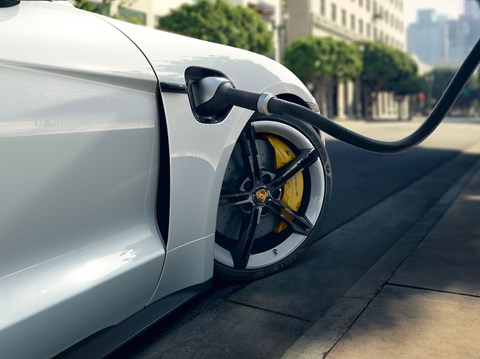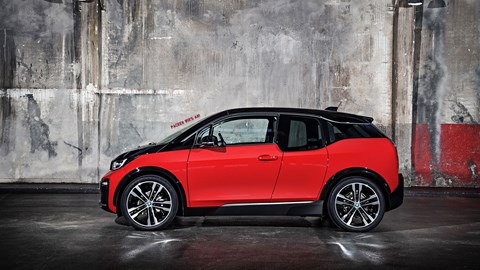► Electric car tax: how it works
► VED, benefit-in-kind and more
► Why EVs could save you tax
Electric cars are becoming more and more popular, thanks to growing supply, increased awareness and a swelling infrastructure to recharge them. It's also worth noting that most drivers will save a bundle on electric car tax - as electric vehicles (EVs) attract considerable savings from the UK Exchequer.
This is particularly true if you want to run an EV as a company car. From 6 April 2020, the rate of benefit-in-kind on electric cars has been reduced to zero. Nada! Nothing! So if you're a user-chooser who's still able to select your next fleet car despite the coronavirus lockdown, read on to find out how much you could save up to £7000 in our handy electric car tax guide.
Here's our guide to car tax for petrol and diesel cars
How electric car tax works in the UK
All UK motorists pay to drive their cars on British roads - and electric cars are no different. But the rate at which they're taxed varies substantially from petrol and diesel cars, as the government attempts to encourage adoption of EVs with a range of tax rebates, credits and incentives.
All pure electric cars attract the very cheapest rate of taxes, saving more than hybrid cars which still rely to a greater or lesser degree on fossil fuels. In this guide we look at the way battery cars are taxed in each department.

On the whole, running an electric car will be cheaper than owning a petrol or diesel car - but an EV will probably still cost more to buy in the first place, owing to the additional cost of batteries. However, you can save a bundle on the purchase price thanks to government incentives in the shape of the Plug In Car Grant, explained in detail here.
Should you still consider buying a diesel car?
VED for EVs: the annual tax bill
Everyone has to pay Vehicle Excise Duty, or VED, to drive on British roads. This used to be called the annual tax disc, but the paper car tax disc was scrapped in 2013. The good news is that VED costs much less for many EV owners.
If you're buying an electric car costing less than £40,000 brand new (including options), then you'll not pay a penny in VED. However, if you are considering a premium EV costing more than that threshold, you're lumped in with gas guzzlers and will pay a higher rate. The same applies to plug-in and hybrid cars that cost over £40k.
Remember that even though electric cars are exempt from VED bills, you still have to tax your car each year on the government website: https://www.gov.uk/vehicle-tax and you must also get an MoT certificate in the normal way.
Benefit-in-kind: electric car company car tax
A major change was introduced on 6 April 2020 for the 2020-21 tax year, meaning that a full electric company car will attract 0% benefit-in-kind, rising to 1% in 2021-22 and 2% in 2022-23. This is a major perk for company car drivers - owning a company-supplied EV is a bit of a no-brainer and a major saving for any fleet drivers.
Supplier Octopus Electric Vehicles estimates that the new 2020 tax changes could save a typical business driver around £7000 over three years.

While this benefit is aimed at changing end user behaviour, there are also numerous upsides for employers providing EVs for their staff: companies going electric will also benefit from National Insurance savings and capital allowances, making it win-win for businesses choosing electric vehicles.
Ian Johnston, CEO of charging firm Engenie said: 'The elimination of benefit-in-kind tax for electric vehicles marks a significant milestone in the journey towards mass adoption. It now makes complete financial sense for millions of drivers across the UK to go electric. Not only will this directly increase the numbers of electric vehicles on the road today, it will also give a huge boost to the all-important second hand electric vehicle market, building momentum for wider electric vehicle adoption in two to three years’ time.'
Company car tax calculator on our sister website Parkers.co.uk
Fuel tax and electric cars
Because electricity is universal, and the taxman can't differentiate between the energy used to power your kettle from your car, there is no special duty paid on energy used to recharge your EV. This is a positive: there is no fuel duty escalator to make your electricity bills balloon every time you fill up. Remember that nearly 60p of every litre of petrol goes straight to the taxman.
So as you can see from the above, choosing an electric car is a great way to save tax for British motorists. If you're considering taking the plunge, our advice is to look past the initially steeper purchase price and do the maths to work out how much you'll save each year - in car tax, benefit-in-kind (if appropriate) and fuel costs. Only once you've done the calculation will you know whether you'd be better off by plugging in or waiting a bit longer.
Further electric car reading
The best electric cars and EVs on sale today
How much does it cost to charge an EV?
The cheapest electric cars on sale
Longest range EVs
The best SUVs